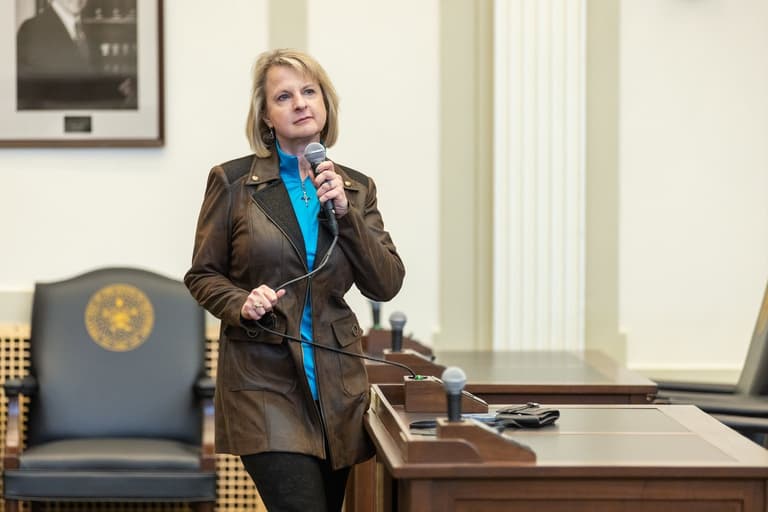
Culture & the Family
Lawmakers vote to allow Christian foster parents to serve
Ray Carter | May 7, 2025
Christian couples could not be barred from serving as foster or adoptive parents based on their religious beliefs under legislation approved by the Oklahoma House of Representatives.
Senate Bill 658, by state Sen. Julie Daniels and state Rep. Denise Crosswhite Hader, says that the Oklahoma Department of Human Services (DHS) cannot require any current or prospective adoptive or foster parent “to affirm, accept, or support any government policy regarding sexual orientation or gender identity that conflicts with the parent’s sincerely held religious or moral beliefs as a condition for eligibility to adopt or foster.”
The legislation also requires that state officials take “into account the religious or moral beliefs of a particular adoptive or foster child, or his or her family of origin including, but not limited to, the child’s or family’s views regarding sexual orientation and gender identity” when determining where to place a child, and that DHS still has a duty to “make each placement consistent with the best interests of the child.”
Crosswhite Hader, R-Piedmont, noted that about 450 children in the Department of Human Services’s foster-care system currently need an adoptive family. She said those children will have a better shot at placement if the state maximizes the number of prospective adoptive families by allowing individuals with sincere religious beliefs, on issues such as sexuality, to serve.
“We are making the pool larger by saying that we will not discriminate,” Crosswhite Hader said.
Under a California state law, prospective foster parents have been required to proactively “affirm” a child’s chosen gender identity or sexual orientation. The California Policy Council reports that the law has led to a “purge” of Christian foster parents in California, who are “being systematically excluded from California’s foster care system.”
Crosswhite Hader said lawmakers should work to avoid a similar outcome in Oklahoma.
But opponents said couples serving as foster parents should embrace and affirm lesbian, gay, bisexual and transgender (LGBT) children, touting the importance of acceptance.
Yet even as they spoke of acceptance, many of the bill’s opponents demonized Oklahomans who do not believe they should agree with and “affirm” a child’s view that he or she was born in the wrong body and is a member of the opposite sex.
“This isn’t about religion,” said state Rep. Cyndi Munson, D-Oklahoma City. “Quite frankly, I don’t know that it’s about helping children. It’s about marginalizing people, Oklahomans, who all deserve love.”
State Rep. Michelle McCane, D-Tulsa, said the bill was “legislating additional trauma on kids” and “furthers hate and division.” She said the couples who would benefit from SB 658 should not be allowed to serve as foster or adoptive parents.
“This is a continuation of previously homophobic legislation that we’ve passed,” McCane said.
However, officials have long noted that one coping mechanism of children who have been sexually abused is to try to alter their appearance to reduce feminine or masculine traits, which can sometimes include identifying as a member of the opposite sex.
The National Crimes Against Children Investigators Association (NCACIA) has noted that childhood sexual abuse “can be particularly damaging to a child’s developing sexuality” and “lead to confusion about their sexual orientation and the formation of unhealthy coping mechanisms.”
State Rep. Ellen Pogemiller, D-Oklahoma City, dismissed data from other states showing families were being barred from serving as adoptive parents based on their religious beliefs.
“I do not believe that families are being turned down,” Pogemiller said.
Crosswhite Hader said the bill does not guarantee a family will be approved to foster or adopt a child, and that officials will still focus on matching a child to the family that is the best fit for a youth.
She said the bill simply increases the pool of potential foster and adoptive families in Oklahoma.
“What this bill does is give more opportunity for people to be considered,” Crosswhite Hader said. “We will still do the very best that we can to match the child and the potential family so that it’s good for that child. If they’ve come from a Muslim home, I know that DHS works to see if they can find someone who has that same deeply held religious belief and match them. We know sometimes that they may have an LGBTQ background, and so if there’s a foster family that wants to do that, they have that opportunity too. But what we know has happened in other states is we have had people with a deeply held religious belief be a foster family for up to nine years, and then when they would not affirm something that was against the religion that they had, they were pulled out of the pool.”
SB 658 passed the Oklahoma House of Representatives on a 68-19 vote. The legislation, which previously passed the Oklahoma Senate on a 38-7 vote, now proceeds to Gov. Kevin Stitt.

Ray Carter
Director, Center for Independent Journalism
Ray Carter is the director of OCPA’s Center for Independent Journalism. He has two decades of experience in journalism and communications. He previously served as senior Capitol reporter for The Journal Record, media director for the Oklahoma House of Representatives, and chief editorial writer at The Oklahoman. As a reporter for The Journal Record, Carter received 12 Carl Rogan Awards in four years—including awards for investigative reporting, general news reporting, feature writing, spot news reporting, business reporting, and sports reporting. While at The Oklahoman, he was the recipient of several awards, including first place in the editorial writing category of the Associated Press/Oklahoma News Executives Carl Rogan Memorial News Excellence Competition for an editorial on the history of racism in the Oklahoma legislature.